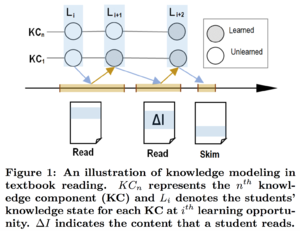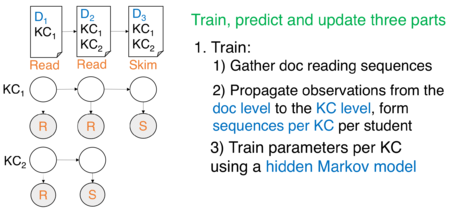Difference between revisions of "Dynamic Knowledge Modeling in Textbook-Based Learning"
| Line 1: | Line 1: | ||
| − | Various e-learning systems that provide electronic textbooks are gathering data on large numbers of student reading interactions. This data can potentially be used to model student knowledge acquisition. However, reading activity is often overlooked in canonical student modeling. Prior studies modeling learning from reading either estimate student knowledge at the end of all reading activities, or use quiz performance data with expert-crafted knowledge components (KCs). In this work, we demonstrate that the dynamic modeling of student knowledge is feasible and that automatic text analysis can be applied to save expert effort. We propose a data-driven approach for dynamic student modeling in textbook-based learning. We formulate the problem of modeling learning from reading as a reading- time prediction problem, reconstruct existing popular student models (such as Knowledge Tracing) and explore two automatic text analysis approaches (bag-of-words-based and latent semantic-based) to build the KC model. We evaluate the proposed framework using a dataset collected from a Human-Computer Interaction course. Results show that our approach for reading modeling is plausible; the pro- posed Knowledge Tracing-based student model reliably outperforms baselines and the latent semantic-based approach can be a promising way to construct a KC model. | + | Various e-learning systems that provide electronic textbooks are gathering data on large numbers of student reading interactions. This data can potentially be used to model student knowledge acquisition. However, reading activity is often overlooked in canonical student modeling. Prior studies modeling learning from reading either estimate student knowledge at the end of all reading activities, or use quiz performance data with expert-crafted knowledge components (KCs). In this work, we demonstrate that the dynamic modeling of student knowledge is feasible and that automatic text analysis can be applied to save expert effort. We propose a data-driven approach for dynamic student modeling in textbook-based learning. We formulate the problem of modeling learning from reading as a reading- time prediction problem, reconstruct existing popular student models (such as Knowledge Tracing) and explore two automatic text analysis approaches (bag-of-words-based and latent semantic-based) to build the KC model. We evaluate the proposed framework using a dataset collected from a Human-Computer Interaction course. Results show that our approach for reading modeling is plausible; the pro- posed Knowledge Tracing-based student model reliably outperforms baselines and the latent semantic-based approach can be a promising way to construct a KC model. |
| + | |||
| + | Overall, our work could be considered as the first step to model dynamic knowledge in textbook-based learning. We believe that our framework is promising and that its application lies beyond textbook-based learning. This framework can be applied to a broader context of open-corpus personal- ized learning, empowering learners with the ability to access the right reading content at the right moment, despite the huge volume of online educational content. | ||
| + | |||
[[Image:ReadingLearningProcessExplain.png|300x300px]] | [[Image:ReadingLearningProcessExplain.png|300x300px]] | ||
Latest revision as of 16:34, 4 December 2016
Various e-learning systems that provide electronic textbooks are gathering data on large numbers of student reading interactions. This data can potentially be used to model student knowledge acquisition. However, reading activity is often overlooked in canonical student modeling. Prior studies modeling learning from reading either estimate student knowledge at the end of all reading activities, or use quiz performance data with expert-crafted knowledge components (KCs). In this work, we demonstrate that the dynamic modeling of student knowledge is feasible and that automatic text analysis can be applied to save expert effort. We propose a data-driven approach for dynamic student modeling in textbook-based learning. We formulate the problem of modeling learning from reading as a reading- time prediction problem, reconstruct existing popular student models (such as Knowledge Tracing) and explore two automatic text analysis approaches (bag-of-words-based and latent semantic-based) to build the KC model. We evaluate the proposed framework using a dataset collected from a Human-Computer Interaction course. Results show that our approach for reading modeling is plausible; the pro- posed Knowledge Tracing-based student model reliably outperforms baselines and the latent semantic-based approach can be a promising way to construct a KC model.
Overall, our work could be considered as the first step to model dynamic knowledge in textbook-based learning. We believe that our framework is promising and that its application lies beyond textbook-based learning. This framework can be applied to a broader context of open-corpus personal- ized learning, empowering learners with the ability to access the right reading content at the right moment, despite the huge volume of online educational content.
Publications
- Huang, Yun, Michael Yudelson, Shuguang Han, Daqing He, and Peter Brusilovsky. "A Framework for Dynamic Knowledge Modeling in Textbook-Based Learning." In Proceedings of the 2016 Conference on User Modeling Adaptation and Personalization, pp. 141-150. ACM, 2016. (paper) (presentation)


